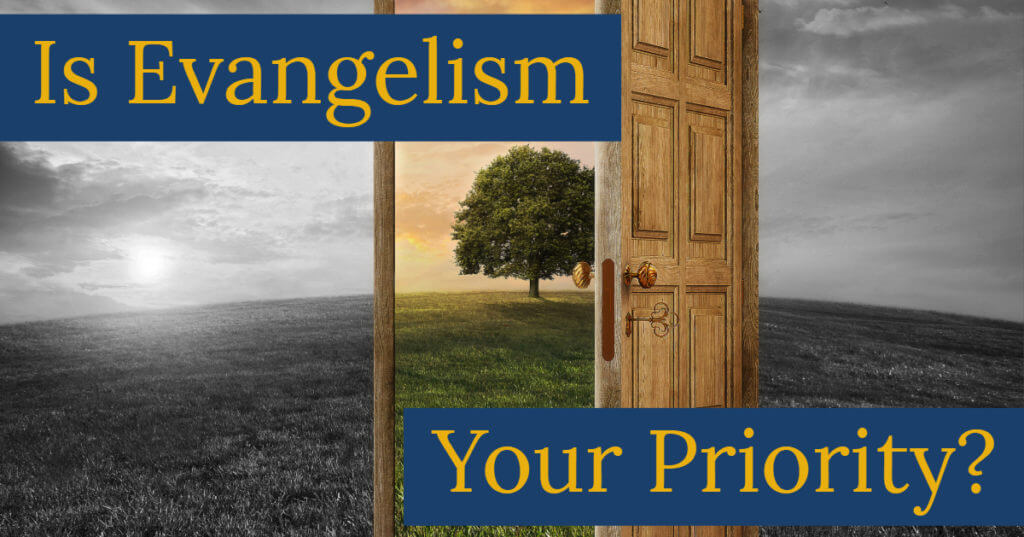I recently received correspondence from The Episcopal Church Pension Fund. Since I had been ordained in The Episcopal Church (TEC) for six years before I was, proudly, deposed, I still have a bit of retirement money invested in the fund. What was interesting to me was receiving a letter addressed to, “Mr. Mark Eldredge.” Mister! I’m so accustomed to being addressed, “Fr.” or “Rev.”, the “Mr.” was a glaring reminder to me that my stance for Biblical faithfulness caused TEC to shut the door to me. Praise God that my identity was not in a denomination but rather in The Kingdom of Heaven whose door will never be shut to me!
For many of us in the Anglican Church in North America (ACNA), that same TEC door was closed. Yet the door to God’s Kingdom remained and remains wide open for us to dwell in both now and forever. And Jesus’ words to the Church in Philadelphia found in Revelation 3:7-13 (NLT), as a church that seemingly had the door to the local synagogue closed on them, should be an encouragement to us, both for our previous stance and our current faithfulness:
Write this letter to the angel of the church in Philadelphia. This is the message from the one who is holy and true, the one who has the key of David. What he opens, no one can close; and what he closes, no one can open: I know all the things you do, and I have opened a door for you that no one can close. You have little strength, yet you obeyed my word and did not deny me. Look, I will force those who belong to Satan’s synagogue—those liars who say they are Jews but are not—to come and bow down at your feet. They will acknowledge that you are the ones I love. Because you have obeyed my command to persevere, I will protect you from the great time of testing that will come upon the whole world to test those who belong to this world. I am coming soon. Hold on to what you have, so that no one will take away your crown. All who are victorious will become pillars in the Temple of my God, and they will never have to leave it. And I will write on them the name of my God, and they will be citizens in the city of my God—the new Jerusalem that comes down from heaven from my God. And I will also write on them my new name. Anyone with ears to hear must listen to the Spirit and understand what he is saying to the churches.
Given that there is no disapproval from Jesus to this church, it wasn’t immediately clear to me what God might want to say to us about church revitalization. The language about doors though brought to my mind one of my favorite poems. In fact, it wasn’t hard to make the connection as I have the poem framed and sitting on my desk. It is called “I Stand By The Door” by Sam Shoemaker.
The poem is about evangelism. Evangelism is a choice. Even though it is only one of the five VITAL areas a church needs to have working effectively to be healthy and grow, it is often the one done the least. Part of the reason for that is because we so enjoy the other areas like, fellowship with other believers, growing in our faith through study and prayer, serving, and of course experiencing excellent worship of our Lord. We can more than fill up our time and energy on these important areas! And then evangelism only gets talked about but not really done.
What I love about this poem is that it describes the choice to make evangelism a priority. It’s not saying the other parts of Christianity aren’t important. They are. But some of us need to choose to keep evangelism a priority if it’s going to get done and keep the door to God’s Kingdom open in our congregations. I am convinced that if we make evangelism our number one priority, it will get done and all the other vital areas will still continue strong. I hope you are as inspired by this poem as much as I am:
I Stand By The Door
by Sam Shoemaker
I stand by the door. I neither go too far in, nor stay too far out. This door is the most important door in the world. It’s the door through which men walk when they find God. There’s no use my going way inside and staying there when so many are still outside. And they, just as I, crave to know where the door is. And all that so many ever find is only a wall where that door ought to be. They creep along the wall like blind men with outstretched groping hands feeling for a door, knowing that there must be a door, yet they never find it.
So I stand by the door.
The most tremendous thing in the world is for men to find that door, the door to God. The most important thing any man can do is to take hold of one of those hands, and put it on that latch, the latch that only clicks and opens to that man’s own touch. Many die outside that door as starving beggars die on cold nights in cruel cities in the dead of winter, die for want of what is within their grasp. They live on the other side of that door. They live because they have not found it. Nothing else matters compared to helping them find it, and open it, and walk in and find God.
So I stand by the door.
Go in great saints, go all the way in. Go way down into the cavernous cellars and way up into the spacious attics in its vast roomy house, this house where God is. Go into the deepest of hidden casements of withdrawals, silence and sainthood. Some must inhabit those inner rooms and know the depths and heights of God, and call outside to the rest of us how wonderful it is in there. Sometimes I take a deeper look in. Sometimes I venture in a little further. But my place seems to be closer to the opening.
So I stand by the door.
There’s another reason why I stand there. Some people get part way in and become afraid lest God and the zeal of His house devour them. For God is so very great and asks all of us. And these people feel a cosmic claustrophobia, and they want to get out. “Let me out!” they cry. And the people way inside only terrify them even more. Somebody must be by the door to tell them that they’re spoiled. For the old life they have seen too much. Once you taste God, nothing but God will do ever again. Somebody must be watching for the frightened who seek to sneak out just where they came in, and tell them how much better it is inside.
The people too far in don’t see how near these people are to leaving, preoccupied with the wonder of it all. Somebody must watch for those who have entered the door but would like to run away.
So, for them too, I stand by the door.
I admire the people who go way in, but I wish they wouldn’t forget how it was, before they got in. Then they would be able to help the people who have not yet even found that door, or the people who want to run away again from God. You can go in too deeply, you can stay in too long, and forget the people outside the door. As for me, I’ll take my old accustomed place, near enough to God to hear Him, and know that He is there, but not so far from men as not to hear them and remember they are there too. Where? Outside the door – Thousands of them. Millions of them. But more important for me, one of them, two of them, ten of them, whose hands I am intended to put on the latch. So I stand by the door and wait for those who seek it. I’d rather be a doorkeeper.
So I stand by the door.
The Rev. Cannon Mark Eldredge is Director of Church Revitalization and Coaching for the American Anglican Council.



